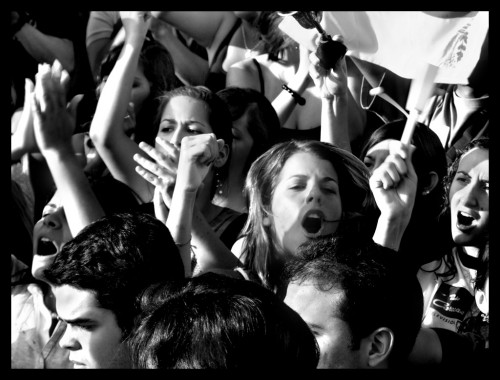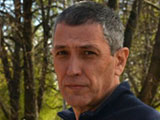Existential Exile
by Israel Centeno and translated by Alex Higson / October 24, 2013 / 1 Comment
On leaving Venezuela and the shrinkage of all gray areas.

Students protesting for freedom of expression in Caracas in 2007. Photo: Rodrigo Suarez via Flickr
My exile began long ago, before I left Venezuela. It began when I became suspicious of my country’s militarized reality, of its war horns calling you to vote, of its frustrating polarization, of the impossibility of seeing any shades of gray. Granted, for a while, I tried to resist, to create a reality from which I could move on. First I went into the mountains; I walked across Cerro El Ávila like a man obsessed, feeling like I was creating my own magical space, as by this point I could no longer visit friends from my childhood and youth, since many had begun to treat me as “the enemy.” In a war where there are heroes and traitors and families break down as they are driven to madness by fanaticism, it becomes difficult to experience any gray space.

- From his lonely watch post Albert Camus asked who among us has not experienced exile yet still managed to preserve a spark of fire in their soul. “We’re all alone,” Natalia Sedova cried in exile on hearing of her husband Leon Trotsky’s affair with Frida Kahlo. In his novel Night Watch, Stephen Koch follows the incestuous love affair of David and Harriet, wealthy siblings watching the world from their solitary exile. Koch’s writing, Camus’s theories, and Trotsky’s affair all come back to exile and lead me to reflect on the human condition. From my own vantage point, my Night Watch, I will reflect on my questions of exile, writing, and the human condition.

- Israel Centeno was born in 1958 in Caracas, Venezuela, and currently lives in Pittsburgh as a Writer-in-Residence with City of Asylum/Pittsburgh. He writes both novels and short stories, and also works as an editor and professor of literature. He has published nine books in Venezuela and three in Spain.
I left Caracas devising dystopias, telling about a city that closes itself off to itself, and have continued to do so since then. Now I have a broader vision: From outside the country one can see that the problem is not just Chávez, it can also be the inclusion of the neo-Nazi group known as Golden Dawn to the Hellenic Parliament; Europe too is facing its dilemmas once again, with swastika-bedecked flags flying in the streets of Barcelona. The Far and Near East. Will extremists steal the scene once again and create another huge uprising? Let us also look at the censoring of information and violation of privacy at global level. Orwell’s 1984 is like a wild electrical storm, shocking our dearest ambitions for tolerance and independence.
II
My exile was spent between El Ávila and some classrooms at the Late-Night Culture Center where I led creative-writing workshops. As my life has gone by I can claim to have walked across my city in its entirety, and nothing in it felt strange to me. Then one day I saw it reduced to tiny spaces. To small circles of people without hope. I could not bear to see a mid-morning execution on the Francisco Fajardo road, to be a passive witness to armed robberies on the Cota Mil highway at six in the evening, to be a victim of the dictatorship of chaos. Nor could I bear the threats. One day I feared becoming one of those people who, in living in a lawless place, must accept it, justify it, and adopt the required timidity of the survivor, in an atmosphere that reminds me so much of certain spaghetti westerns.
It is a polarized dynamic, and from an overexposure of empty discourse—the worst part of politics—it appears. The negation of itself is its discourse.
Many young people, fed up with living bombarded by slogans without argument, now have in front of them an empty project. Tormented by heroic drumming, by the useless violence that claims the lives of its victims on the streets of its towns and cities, by a statistically scandalous violence, they abandon Venezuela. They leave the country however they can and start spending time with their elders among a diaspora that doesn’t necessarily appear on a physical map, because exile has turned it into an existential matter.





One Comment on "Existential Exile"
u_u “Because exile has turned it into an existential matter.”